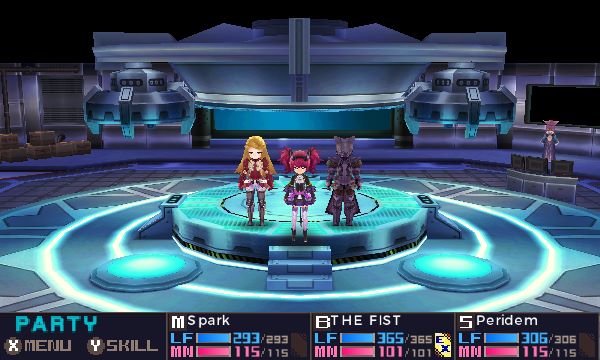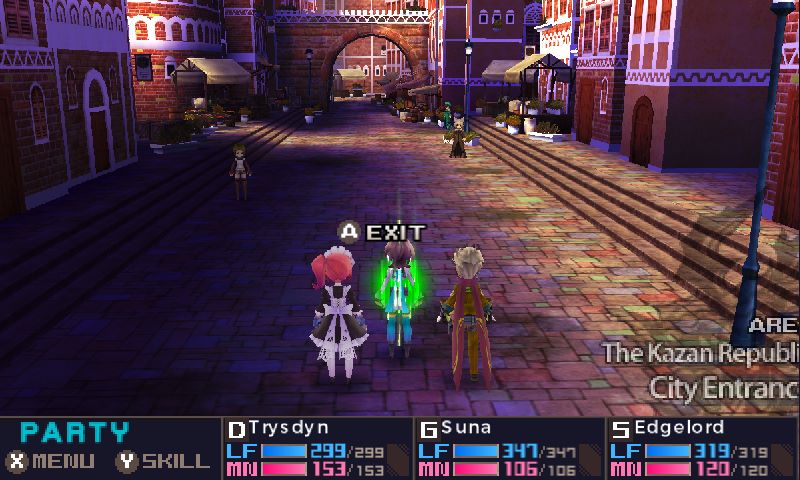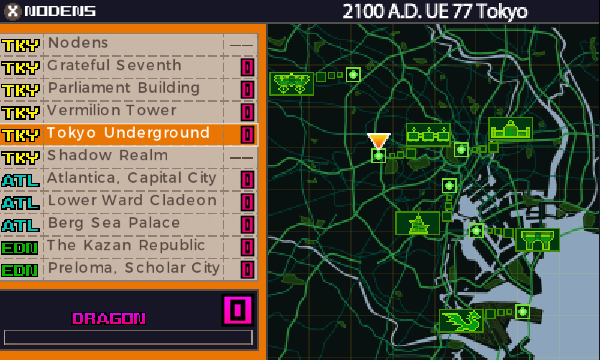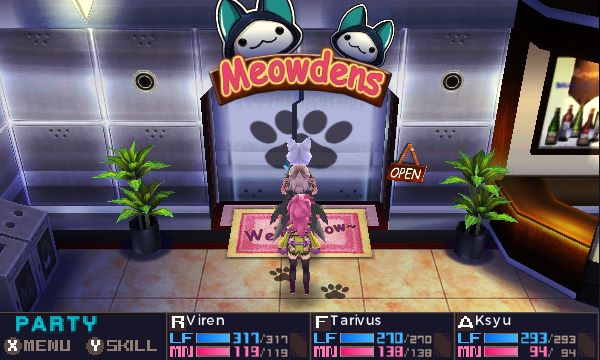2022-11-03: 7th Dragon III: Code VFD -- The End of the Dragon Chronicle
At some point earlier this year I played through 7th Dragon 2020-II. I didn't really write about it because there wasn't much to write about. In truth, 2020-II is just a continuation of 2020, with no mechanical additions to speak of save for the introduction of one new class: The Idol. She's a party-wide heal/buff character who gets a super powerful AoE attack late in the game. She trivialized everything. 2020-II feels more like a second half of 2020 than its own game. Great in its own right but nothing new to speak of.
7th Dragon III: Code VFD, though, is quite different. The 7th Dragon series started on the Nintendo DS, then moved to the PSP, then moved back to the 3DS for its final chapter; and this is the final chapter. In the middle of development the studio went bankrupt and Sega had to take up the project and finish it. It's a good thing they did too, VFD may be the best game of an already amazing series.
You can tell from the beginning that VFD is intended to be a wrap-up game. It's full of references and homages to the prior games, even going so far as to more tightly tie 7th Dragon into its 2020 counterparts; a connection that was flimsy and largely implied at best in prior titles. VFD also returns to its more poppy, bright, and fun aesthetic that you see in the prologue of 7th Dragon. Everything is cool, there is no major dragon threat, and you're a budding hero doing fledgling hero things. No pressure, no looming threat of destruction.
VFD takes place in Tokyo 75 years after the events of 7th Dragon 2020 and 2020-II. A lot of the city is still a wreck but civilization has largely recovered to the point where things like "video game megacorps" can happen again. It's one of those corps that forms the nexus of the plot. As part of trying out an exclusive VR game that chronicles the events of 2020, you set a high score and flag the attention of the game's developers. Those developers call you into a secret meeting and tell you that dragons are preparing to return, but you uniquely have the power to battle them. They want to conscript you into their anti-dragon force and gather samples of the titular 7 True Dragons to make a weapon that can defeat them when they return.
Nodens corp's tool for gathering these samples is a time machine and your first stop is Atlantis: the home of the Lucier that you only hear reference to in the prior games. Your first true dragon to hunt is Nyala, the final boss from the original 7th Dragon. That's how fast they start tying in prior games. Series fans will recognize almost all of the visitable locations.
As an interlude here: Code VFD is the only 7th Dragon game to get an official localization in the west. That means most people who played it weren't aware of all the backstory leading up to this point and all the references went over their heads. I personally feel that's quite a shame since I spent most of this playthru bouncing up and down at the references and throwbacks strewn all through the game. But I digress.
VFD keeps the "three characters and skill points" model of things, but mixes up the class distribution heavily. You start with access to four classes (with one having two forking build paths) and they're all mashups of former classes in really strange and unique ways. The Agent is a combination of the Trickster and the Hacker, the God Hand is this strange hybrid of the Destroyer and the Healer, the Samurai is... still basically a Samurai actually (though you choose two-hand or dual-wield and have no reason or capability to change once you do). Then you have the Duelist, which is the most Yu-Gi-Oh thing in an RPG since the Yu-Gi-Oh games. The Duelist is a mage that draws a hand of up to six cards at random and expends them to cast spells. If you love RNG, you'll love that.
The first third of the game feels extremely 2020 in this way. You take your party of three, go out, gain some skill points, learn skills. Not much is different. The graphical style is the same, the interface is the same. It's just on the 3DS so your map is on a sub-screen and not superimposed over the main view. Field skills are still there but they removed the skills that completely obsoleted certain consumable items. Namely the "Warp Wire" and encounter reduction.
Toward the end of the Nyala arc, things change. You ally with the Lucier, gaining access to two new classes: The Rune Knight and the Fortuner. The Rune Knight is a sort of magic tank that can give party-wide defense buffs, provoke, and do elemental hits. The Fortuner is a hybrid support/attack class that relies on end-of-turn and random-chance effects for support, then does damage by inflicting status effects then using spells that critical if they hit a target afflicted by those effects. It's neat, but too conditional to really give you any control.
In most RPGs of this nature I wouldn't bother since I already had an established team. VFD does something fairly brilliant here to encourage more build experimentation: upon allying with the Lucier you get a second team of three. They don't just sit in the base either; they go with you into dungeons. They gain experience and skill points. You can swap which team goes into combat (though only choosing which team, you can't remix your teams in the dungeon). They can also assist your main squad in battle once every few turns. It's an amazing and neat system.
Catch-up experience is fairly drastic, ensuring this second team will be caught up to your main squad quickly. Good thing too; soon after this point you get forced into an event that splits your squad in half and forces you to control each team solo for a time. This segment is fairly forgiving: the enemies are weaker than normal. So if you built an absolutely dumpster B-squad, it's probably okay. I imagine most people built a second squad of a Rune Knight, Fortuner, and whichever class they didn't take from the initial four; I did.
After taking down Nyala and saving Atlantis, you alter the timeline. Atlantis was fated to be destroyed, but due to your interference it sinks into the sea whole rather than blowing to bits. Your handlers at Nodens claim you can't change the present from the past and you likely just created a parallel timeline you'll never see, but changes in modern day start showing up, throwing the entire concept into confusion.
Your next stop is the far future: the land of Eden in the year 7000. You land in Kazan, the starting town of the original 7th Dragon. I screamed when I got this. Your approximate landing point is some time after the events of the original game, but the bloom is there. Turns out your saving of Atlantis gave another True Dragon a shelter after his defeat. The True Dragon Haze raised Atlantis as a twisted tower in the middle of Kazan and used it as a base. Oops. Sidenote: Haze is one of the major arc bosses from the original game.
Worthy of note: the original 7th Dragon was a 2D affair, so to port Kazan (and later Pleroma) into the VFD engine, these areas had to be re-imagined from scratch. I feel the renditions are faithful but ultimately shallow. You get two screens of Kazan and some house interiors. Pleroma rocks, but it's only the outdoor section. Areas from 2020 aren't re-used whole cloth like they were in 2020-II but a lot of similar layouts are present.
Before entering the tower, you meet with the people of Kazan and form an alliance, expanding your squad to three teams and gaining two more classes: the Banisher and the Mage. The Mage is just the Mage from the original 7th Dragon; all the buff-to-attack wombo combos are even still in tact. The Banisher is a gun-lance wielding knight who does burst damage with a limited ammo resource in a manner very reminiscent of the Imperial from Etrian Odyssey IV. My third team was these two and the "other" Samurai build.
Also present in Kazan: Emel, the only allied NPC to be present in every 7th Dragon game. She becomes plot-critical, of course.
After dispatching Haze and wrapping up the plot that occurs there, the dragon invasion of 2100 begins in earnest. You're given a very heavy-handed and unusual warning here: wrap up your business before ending the chapter. You're warned three times, actually. This was significantly worrisome since 7th Dragon is a series that hangs its hat on never, ever making something in the game permanently missable.
The warning was sound. I won't spoil it, but the transition from the Eden arc to the finale lays down a massive point of no return and pushes you forward into the abandoned buildings of Tokyo. You're sent to the original Parliament building that Murakumo used as a base in 2020, except it's abandoned and dragon infested. Then things get weird before the final battle with the 7th True Dragon.
The plot also gets dark here. Every 7th Dragon game has been about humanity coming to the edge of extinction and the last couple of hundred surviving people ending up huddled inside of some dingy building with no power and barely able to survive, but the series has, by and large, touched very lightly on the emotional horror of this situation. VFD leans into it. Once the final True Dragon shows up, bodies start piling up. The entire finale is filled with down and dirty gut punches and heart string tugs. My advice would be to make sure you're emotionally girded before going forward when your handlers start warning you to finish your business.
This is an extremely light touch on the plot so as not to spoil anything too badly. VFD continues the tradition of having very deep and well-written characters with endearing and engaging story lines and an interplay between them that gives them this sense of depth and personality that most RPGs can't match. In VFD, it's that interplay that guides your investment in the plot and makes the highs and lows of the story that much more pronounced. No Hatsune Miku this time, though.
And yes, ultimately VFD does hold true to the series praxis of "No perma-missables".
The dragon count for this one is 256, which I still feel is a pretty decent number. The 666 from the original game was way too many and that's a lesson they learned well and stuck to. Like the other games, completely purging the world of dragons opens up the post-game dungeon. I might actually play this one since it's the final chapter.
Like the other 7th Dragon games, though, the difficulty curve doesn't seem calibrated very well for completely hunting the dragons in each area before moving to the next. Doing so breaks you free of the power curve early and it never catches up. Part of this might come down to build; I have to keep in mind after playing so many "free build" RPGs that I probably have a knack for picking out combinations that work and therefore these games are easier for me than the average player.
There's one exception: the boss at the end of the Eden arc is probably the most difficult boss fight in the series. Well deserved, too.
Shortly after Eden, though, I gained access to the EX Skills. These are skills that can only be activated when your EX/Burst/Limit/whatever gauge is full and are more powerful than usual. Problem is, when you have one of these rare precious one-time skills, they synergize extremely well with buffing up before activating them. The 7th Dragon games have no shortage of stacking buffs that fold into each other and turn a normal skill into a massive powerful burst; doing this with the right EX skill can just delete entire bosses.
Like I did with the final boss. One-shot from 100%. That was, maybe, a tiny bit of a let-down. If you want a challenge, maybe don't use the EX skills.
As a send-off for the series, this was a well executed romp through old references, old locations, seeing old characters and tying some plot threads up neatly. You learn about NPCs from prior games who had unanswered questions at the end of their plots. You see how things turned out. You ultimately save the world from dragons for good, in a way that would be really hard to continue from. It's all a very final punctuation on a series I've enjoyed immensely. Some of the finale felt like a bit of a reach, but honestly after all of the philosophical woo about "only the strong should rule" from the prior games, I was ready for anything.
VFD, like the other games, is grindy. It can be tedious to hunt all the dragons and if you do your reward is becoming absolutely overpowered so all challenge in the game vanishes. I think that's okay though; the plot, and aesthetics, and the feel of being a hero are all so on point it's a great experience just the same. In a way, one-shotting the final boss to put an end to the dragon threat for good is poetic. It fits into the story being built: a story of evolution and growth and two forces that collide at a fated point.
I'm sad the series is over. I could go back and re-play them all with different team compositions in a year or so. VFD is the only game I feel like I toured every class in, due to the nine-person party.
Also Twitch ate my VODs of this playthru because the VFD soundtrack is in their content ID system. Not the vocaloid music of 2020, this one. What a pantload.
tags: game_writeup, rpg, 7th_dragon







